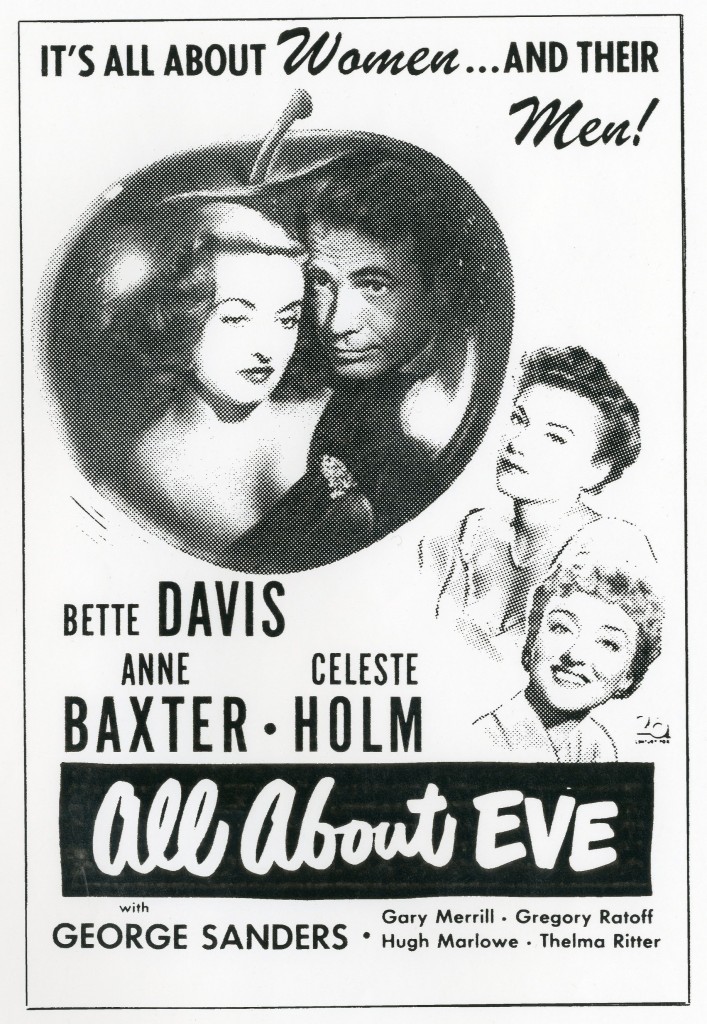 Our fifth classic of 2014 is a show business drama of the New York theater scene, All About Eve. It is a 1950 movie which, in a very strong year for really good movies, set a record with an astonishing fourteen Academy Award nominations (only 1997’s Titanic has tied that quantity). It won six of those nominations, including the big prize, and quickly became the greatest example of bitchy backstage drama ever seen.
Our fifth classic of 2014 is a show business drama of the New York theater scene, All About Eve. It is a 1950 movie which, in a very strong year for really good movies, set a record with an astonishing fourteen Academy Award nominations (only 1997’s Titanic has tied that quantity). It won six of those nominations, including the big prize, and quickly became the greatest example of bitchy backstage drama ever seen.
It rejuvenated the career of Bette Davis, whose career had noticeably diminished after 1946, and gave a great role to Anne Baxter, who had won an Oscar for The Razor’s Edge in 1946 (now that’s trivial). Years later, when the movie was converted into the Broadway musical “Applause” — which was a huge hit for Lauren Bacall — Baxter completed the circle by portraying Margo Channing (Davis’ role) on the stage. Davis long credited this film for reviving her career (she was just 42, but thought she might be washed up for lack of strong roles), and everyone else in the cast benefitted from being in such a popular and acclaimed hit. Bette also found a future husband in the cast — Gary Merrill — to whom she was married from 1950 to 1960.
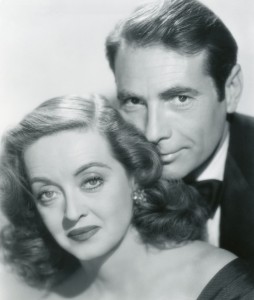
Davis and Merrill comprise one of three principal couplings in the story. Actress Margo Channing (Davis) is a legend on the Broadway stage, and her success is in part due to boyfriend Bill Sampson (Merrill) who directed her current play. Bill loves Margo dearly, but cannot persuade her to marry him because she is eight years older than he. He doesn’t care about the difference.
Their best friends are playwright Lloyd Richards (Hugh Marlowe) and his wife Karen (Celeste Holm). Lloyd has written Margo’s current play, “Aged in Wood,” and has promised her first shot at his next — although she wants him to age his next heroine so she will be closer in age to the actress. Karen is the only one of the group with no show business ties besides marriage, and it is her naiveté regarding the human nature of theatre people that leads to all the melodrama to come. It is Karen who first deigns to talk to young Eve Harrington (Anne Baxter) and invite her to meet her idol, Margo Channing, backstage. Karen befriends Eve, not realizing that by doing so her loyalties will be severely tested and eventually compromised.
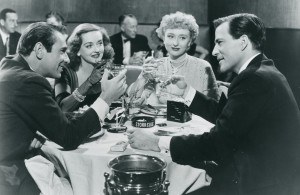
The arrival of Eve Harrington alters everything. Not at first, of course, but she subtly begins to usurp the advantages of proximity and trust that were previously held by Margo’s assistant Birdie Coogan (Thelma Ritter). Soon Margo and Eve are inseparable. Then Margo begins to notice how attentive all the men are to Eve, and how Eve has suddenly developed an interest in acting, just like her idol. Things reach a head when Eve manipulates herself into the position of Margo’s understudy.
Complicating matters is one other character, who serves as the occasional narrator, critic Addison DeWitt (George Sanders). It is he who introduces the characters and pontificates on their relationships and attitudes toward each other, with incisive wit and dry humor. DeWitt tends to take young actresses under his wing, so to speak, and thus forms the third coupling with whoever happens to be present during various scenes. His prime target, especially during the long party sequence, is Miss Casswell (Marilyn Monroe, in just her second major movie). Later, he forms an alliance with a different girl, with truly dramatic results.
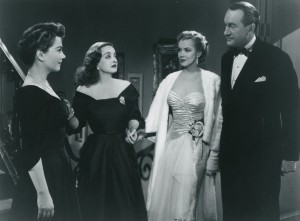
Much of the bitchy tone of the piece originates with Addison DeWitt. His acerbic commentary is razor sharp and occasionally hilarious. I love his retort when Miss Casswell tries fruitlessly to get a drink. She calls out, “Waiter!” but no one notices. DeWitt tells her the drink-bearer is a butler, but she says she cannot call out “Butler!” because that might be someone’s last name. He shoots her a look. “You have a point,” he admits. “An idiotic one, but a point.” That line cracks me up every time I hear it. It contains a structure of respect and yet is mean through and through. This movie is filled with such sharp dialogue, courtesy of writer and director Joseph L. Mankiewicz. All About Eve is not particularly cinematic, but it is so sharply written and beautifully acted that its relatively mundane staging and cinematography are not noticeable drawbacks. More examples of the movie’s wit:
Margo about Bill Sampson: “Bill’s thirty-two. He looks thirty-two. He looked it five years ago, he’ll look it twenty years from now. I hate men.”
Addison arrives at Margo’s party uninvited. Margo: “I distinctly remember, Addison, crossing you off of my guest list. What are you doing here?” Addison replies, “Dear Margo, you were an unforgettable Peter Pan. You must play it again soon.”
Margo admits her age to Lloyd: “Lloyd, I’m not twenty-ish, I’m not thirty-ish. Three months ago I was forty years old. Forty. Four O. That slipped out. I hadn’t quite made up my mind to admit it. Now I suddenly feel as if I’ve taken all my clothes off.”
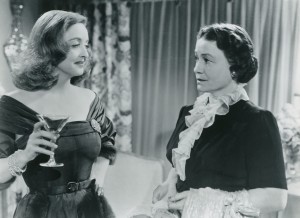
Birdie, on hearing Eve’s history:
“What a story! Everything but the bloodhounds snappin’ at her rear end.”
Birdie, on seeing a bed covered with fur coats: “The bed looks like a dead animal act.”
Margo, discussing a dress with Birdie: “You bought the new girdles a size smaller, I can feel it. Birdie replies, “Something maybe grew a size larger.” Margo: “When we get home you’re going to get into one of those girdles and act for two and a half hours.” Birdie replies, “I couldn’t get into the girdle in two and a half hours.”
Birdie, on working for Margo: “I haven’t got a union. I’m slave labor.”
Margo, when Bill offers to buy her a drink: “I’ll admit I may have seen better days, but I’m still not to be had for the price of a cocktail like a salted peanut!”
Bill says goodbye to Birdie, heading for a job in Hollywood. Bill: “What should I tell Tyrone Power for you?” Birdie replies, “Just give him my phone number; I’ll tell him myself.”
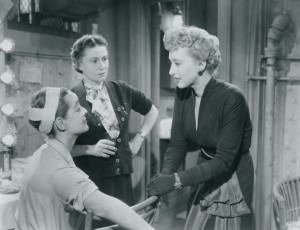
Everyone gets into the act, because all of the parts (except, oddly, Lloyd the playwright, who rarely spouts anything wise or witty) are written with zest and vigor. The chief joy that I derive from All About Eve is delighting in the dialogue and sharp camaraderie among friends, and friendly enemies. Mankiewicz wrote a wonderful screenplay that delivers a lot of laughs early and then turns deliberately cold as Eve’s true colors become clear. And as much as I enjoy the witty repartee, I actually think the movie gets better in the second half. The character of Bill Sampson undergoes a catharsis, but returns to the story at a very opportune moment. Then there is one sequence with Addison and Eve that is absolutely mesmerizing. About the only thing missing from the superb second half is Birdie — and Mankiewicz later admitted that he made a mistake in not writing more for that character to do late in the story. It’s also a tad unbelievable to me that the ascent of Eve takes place so rapidly — within one theatrical season — and that no reporters were around to write about her, and uncover the truth about her.
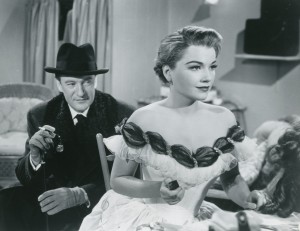
As I mentioned earlier, Bette Davis seemed to get the most attention from this movie — her quote “Fasten your seat belts; it’s going to be a bumpy night!” — is a quintessential moment known to most movie fans; yet it is All About Eve, and for me the most memorable character is Eve Harrington. I think Anne Baxter had a tougher role to play because Eve has to be completely convincing in her early scenes of sincerity, and she is. When she delivers her acceptance speech at the Sarah Siddons awards, she says exactly the right things in exactly the right way, and only because we’ve seen her evolution for two hours do we understand how conniving and selfish she really is. Baxter is, in my opinion, superb as a woman who hunts theatrical stardom with such stealth and determination that it’s almost scary. As opposed to Davis, who flaunts personality at every opportunity, Baxter is required to subdue hers, to appear humble and gracious and sincere, and that’s a tougher job. She really makes the movie work.
Like our earlier classic choice, Grand Hotel, All About Eve is definitely a women’s film because it is all about not only Eve, but Margo, Karen, Birdie, Miss Casswell and even Phoebe (Barbara Bates). Bill, Lloyd and Addison are important (especially Addison, who acts more like a woman than the other men) but the women are the show here, and rightfully so. It’s great, however, that it doesn’t feel or even sound like what is considered a traditional chick flick. The women have the same concerns as the men and sexual matters are intimated but do not rule the day. Mankiewicz’ genius is in making the script almost asexual, keeping the dramatic focus on theatrical matters, friendship, sacrifice and blind ambition. Soap opera-ish elements are kept to a bare minimum, the men accept the women for who they are, and the New York theater scene begins anew every year, paving the way for change and evolution.
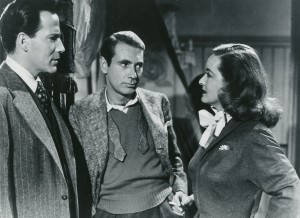
All About Eve is probably the best movie about the theater scene, or even show business, ever made. Within its script cleverness are wise discussions of how theater people differ from others, why dedication is so important and how success can result from hard work. Only a tiny smidge of an actual play is seen, but we can take for granted that these people are consummate pros at the art of the theater. The characters and their interactions provide the movie with its lifeblood, which in this case is pumping at full volume. From the seven main leads through the stellar supporting players (Marilyn Monroe as Miss Casswell, Gregory Ratoff as producer Max Fabian, Barbara Bates as Phoebe), everyone shines in their beautifully-written roles. They resonate with life, whether they are drinking in applause like alcohol, scheming to get ahead in some sneaky way, trying to help someone else, feeling guilty or just trying to find a little happiness. These are great people in a great movie.
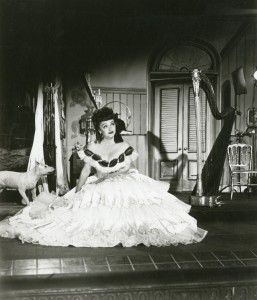
Is All About Eve a classic? Undoubtedly. While it isn’t the most cinematic of films (although I do like the sitting on the stairs staging late in Bill’s welcome back party scene) it tells a wonderfully engrossing story, boasts remarkable characters and is as witty as anything ever put to celluloid. It was a big hit in 1950, was nominated for a boatload of awards, won many of them, and has endured ever since as one of Hollywood’s monuments to show business. It is an acting showcase, whether one prefer’s flamboyance (Bette Davis) or subtlety (Anne Baxter). George Sanders, who played a cad throughout his career, is perfect as Addison DeWitt and won an Oscar for that perfection. It’s got a nice early performance by Marilyn Monroe, who looks great and has star presence despite the limited size of the role. Its script is marvelous in every respect. Perhaps most remarkable is that even with all the dramatic fireworks that Eve’s ascension brings, this is still, at the end, a feel-good movie; I attribute that to the natural disposition of theater people to take just about anything from anyone within their ranks. It’s not exactly forgive and forget, but accept and move on. This is just another wonderful touch in a truly terrific motion picture. Be sure to see it. ☆ ☆ ☆ ☆. 23 February 2014.
